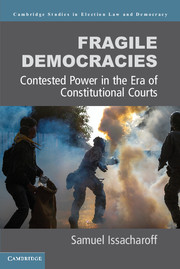Book contents
- Frontmatter
- Contents
- Preface
- Introduction: The Burden of Modern Democracy
- PART I MILITANT DEMOCRACY
- PART II COMPETITIVE DEMOCRACY
- 6 Giving Up Power
- 7 The Promise of Constitutional Democracy
- 8 Transition in South Africa
- 9 The Era of Constitutional Courts
- 10 The Constitutional Bargain
- 11 Can Law Protect Democracy?
- 12 Constitutionalism in the Time of Fragile Democracies
- Epilogue: Democratic Objectives
- Index
11 - Can Law Protect Democracy?
from PART II - COMPETITIVE DEMOCRACY
Published online by Cambridge University Press: 05 July 2015
- Frontmatter
- Contents
- Preface
- Introduction: The Burden of Modern Democracy
- PART I MILITANT DEMOCRACY
- PART II COMPETITIVE DEMOCRACY
- 6 Giving Up Power
- 7 The Promise of Constitutional Democracy
- 8 Transition in South Africa
- 9 The Era of Constitutional Courts
- 10 The Constitutional Bargain
- 11 Can Law Protect Democracy?
- 12 Constitutionalism in the Time of Fragile Democracies
- Epilogue: Democratic Objectives
- Index
Summary
The argument of this book is unreservedly instrumental. There is no claim of “Herculean” wisdom in the judiciary, as per Ronald Dworkin, nor any attempt to engage at a first-order level the arguments for greater democratic legitimacy of the political branches, as per Jeremy Waldron. Instead the argument is that courts have emerged as the stopgap protections to two of the classic disabilities of democracy, particularly for young and untested regimes. The first challenge comes from without in the form of enemies of democracy who use the inherent porousness of democratic politics to undermine the core value of electoral legitimacy that underlies any form of democratic rule. The second comes from within through the suffocating command over the instrumentalities of government by a strong party or strong leader, no longer accountable to meaningful electoral contestation.
Despite the provenance for the new form of court-enforced constitutionalism in the need to watch over the democratic process, the reality is more complicated. In many instances courts back away from this role, fearing wisely or not that intervening in the name of democratic legitimacy threatens direct conflict with political powers. Wojciech Sadurski notes that, despite their strong constitutional mandate, “the dominant justification for the robust position of the constitutional courts of post-communist states in [Central and Eastern Europe] is based on the role of these courts in the protection of individual rights – in particular, those explicitly entrenched in the respective constitutions.” Sadurski attributes this reluctance to engage the preconditions for democracy as such to, at least in part, “the existence of reasonable disagreement about the processes and devices of democracy.”
But the reluctance to embrace democracy as the metric for court oversight can hardly be explained by the complexity of the ensuing inquiry. Constitutional law abounds with topics such as abortion, affirmative action, hate speech, or same-sex marriage that are no less subject to disagreement for being framed in the language of rights.
- Type
- Chapter
- Information
- Fragile DemocraciesContested Power in the Era of Constitutional Courts, pp. 241 - 268Publisher: Cambridge University PressPrint publication year: 2015



